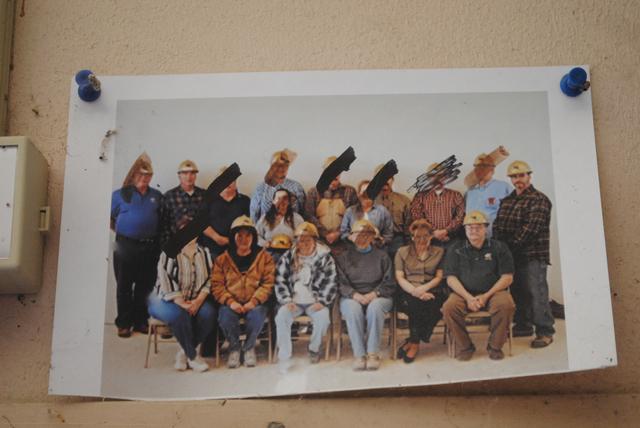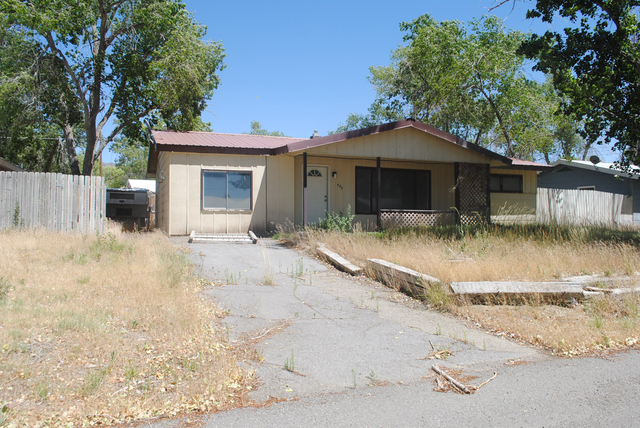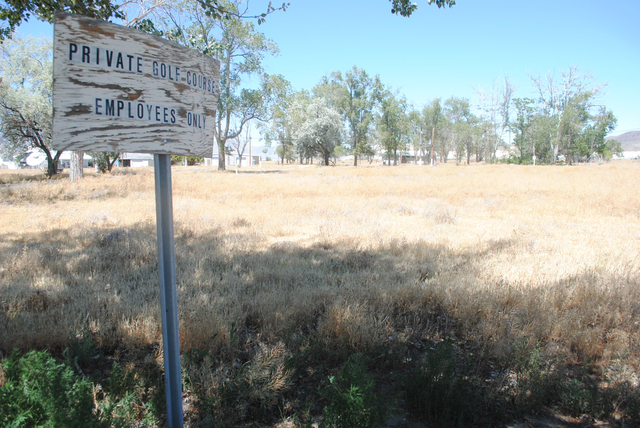Empire Mining Co. plans to pump new life into Nevada ghost town
RENO — For the first time in five years, there is change in the town of Empire.
Grass is being cut, machinery is being moved and people are coming and going through the front gate.
“Everyone is asking if we’re going to open the pool back up and the golf course — everyone,” said David Hornsby, president and chief operating officer of Empire Mining Co. “The answer is maybe. We don’t know.”
While nearby residents were giddy after the announcement that Las Vegas-based Empire Mining Co. purchased the modern ghost town for $11.38 million in late May, Hornsby cautioned that — despite the good news — Empire may never be quite what it once was.
“For sure, we have to make some (improvements), but not a lot,” said Hornsby, who has temporarily relocated part-time to Empire, 100 miles north of Sparks near Gerlach, just south of the Black Rock Desert.
The company’s operations will not exceed those of U.S. Gypsum Corp., which owned the town, plant and mine from 1948 until the recent purchase. USG shut down all operations, both mining and Sheetrock production, in early 2011 after the economic downturn tanked the construction industry, reported the Reno Gazette-Journal.
At the time, USG employed about 100 people and ran the town of Empire, which had about 300 residents when it closed. In years past, the town’s population was as many as 800. Two llamas, Tony Llama and Llama Bahama, have been the town’s only residents since the town’s closure. They were placed within the town’s perimeter to keep coyotes away from the livestock that graze there.
GOOD TIMES IN 1960s
Steven Lambert, who grew up in Empire, remembers the town in its heyday in the 1960s. Lambert’s father owned the town store and gas station and his mother was the librarian at Empire elementary school and the secondary school in Gerlach; in summers she worked as the lifeguard at the Empire pool.
“I couldn’t get away with anything because anything I did would get to my mom in five seconds flat. Same went for my dad because the store was where everyone in town would gather,” said Lambert, now of Spanish Springs.
The entire community would gather for basketball tournaments, and the children would go rabbit hunting after school since the desert was only “five feet from our backyards,” Lambert said.
“I was kind of surprised that it lasted as long as it did,” Lambert said of the town’s closure a half-decade ago. “Just knowing that I couldn’t go to Empire anymore — I’d go out with my wife and son and I’d want to show them where I grew up, but I can’t. There was a chain link fence around my entire town.”
Lambert was thrilled when he found out the town finally sold.
“I was pretty glad at it. I knew that some of my friends would have a little more economic opportunity even though the operations are going to be a small fraction of what it was in its glory days,” Lambert said.
PLANNING FOR THE FUTURE
For the time being, Empire Mining Co. plans to hire 12 to 15 employees before the end of the year. Already, it has nine on-site. Long term, it may hire 30 to 40 at the most, Hornsby said.
Unlike USG, Empire Mining Co. will not have manufacturing on-site; its gypsum will be shipped to companies that make fertilizer and cement.
Following the town’s closure, rumors around Empire swirled for years: The town had sold (which now is true); the town would house Syrian refugees; Burning Man — the arts nonprofit that hosts the annual arts festival in the Black Rock Desert — was looking at using the property.
Then, a year and a half ago, the Las Vegas-based executives behind Empire Mining Co., which they officially founded in February, started looking at Empire seriously.
Already, they have been in talks with locals, primarily those in Gerlach, a 100-person town just a few miles north of Empire. The company has even spoken with representatives from Burning Man, which may want to use the Empire airport in the future, Hornsby said. Gerlach, which has formed a seasonally fluctuating economy around the annual Burning Man arts festival, was devastated when USG shuttered Empire.
While employment will not add up to the 100 or so workers before Empire’s sudden closure a half-decade ago, Hornsby said that the company is actively looking for a partner or another company that may want to lease out the rest of the facilities that Empire Mining Co. will not be using, which is a lot.
The bulk of the mill, in fact, could be leased out to a manufacturer interested in converting the gypsum into a product. The manufacturer could house its employees in the available homes as well, Hornsby said.
“I think everyone is cautiously optimistic right now because they’ve been through a lot the last few years,” said Hornsby, who met with Gerlach residents in June.
Until then, the town will likely have several dozen residents, including about 10 children that Hornsby knows of, based on the staff that the company already has offered jobs to. In years past, children went to school in Empire, though the school will not be reopened for the time being, Hornsby said.
“Anything that (the company) can do to help. Our economic situation is pretty rough right now,” said Washoe County Commissioner Jeanne Herman, whose district includes Empire.
TOWN STILL STRUGGLING
The town is not rebounding yet. The community pool has been covered and left dry, its fencing weaved with thorny branches. The golf course has become nothing more than a field of dried weeds. Just outside the former post office, helmets tied together still hang from the branches like shoes on a power line.
Yards have grown around basketball hoops, swing sets and laundry lines left behind by the former residents. Inside the homes, all of which are unlocked, some of the walls have the faint outline of frames that once hung. Bedrooms still have glow-in-the-dark stars, murals and kitten-shaped light switch covers.
“Some of the old mill offices, if you go over there, the calendar is still on that date, the day that it shut down in 2011,” said Hornsby. “Still half-full coffee cups, all their files still on their desk. It’s kind of like a bomb just went off and they all evacuated. It’s pretty weird.”
In the offices, name tags, sets of keys and safety handbooks have gathered dust. Some of the refrigerators still have food items, years past their expiration dates.
”There’s sets of golf clubs randomly. You’ll find them all over the place,” said Hornsby, picking up a dusty Polaroid camera he found in one of the offices.
The eeriness is slowly fading, though, as Empire is beginning to look a little less forlorn. Sprinklers are on in some of the yards, and the sound of boombox music and work saws can be heard during the day.
“Starting small is good. It may develop into more in the future. Every little step along the way is good,” said Herman.
Already, nine employees, including Hornsby, have relocated part time to Empire. None of them has yet moved into the homes because most of them are overrun by rodents. Many of the bathrooms are covered in droppings and urine, which makes most of the homes unlivable.
Each home will likely take an average of $15,000 to restore, Hornsby said. None of them, surprisingly, suffered vandalism or pillaging since USG kept two to four employees around for light maintenance of facilities.
As for the golf course, pool and other amenities, such as the country club, post office and school, the town’s population would have to be heftier to justify their reopening.
Lambert would like to return to the town to show his son and wife where he lived for nearly 20 years, although his home on Fourth Street no longer is there. The volunteer fire department years ago burned it down for a training exercise.
“I’ll go look at where my house used to be,” Lambert said.




















